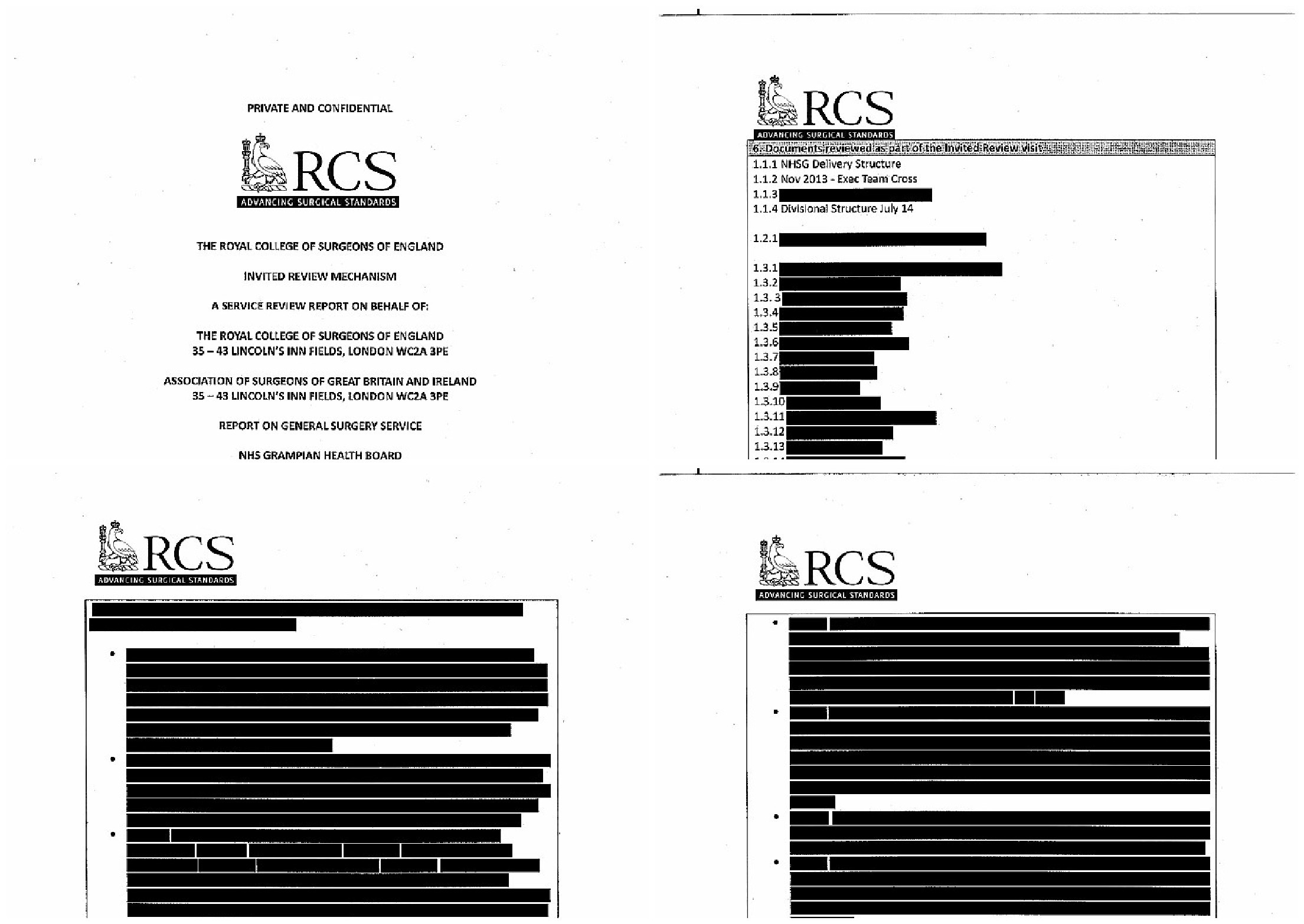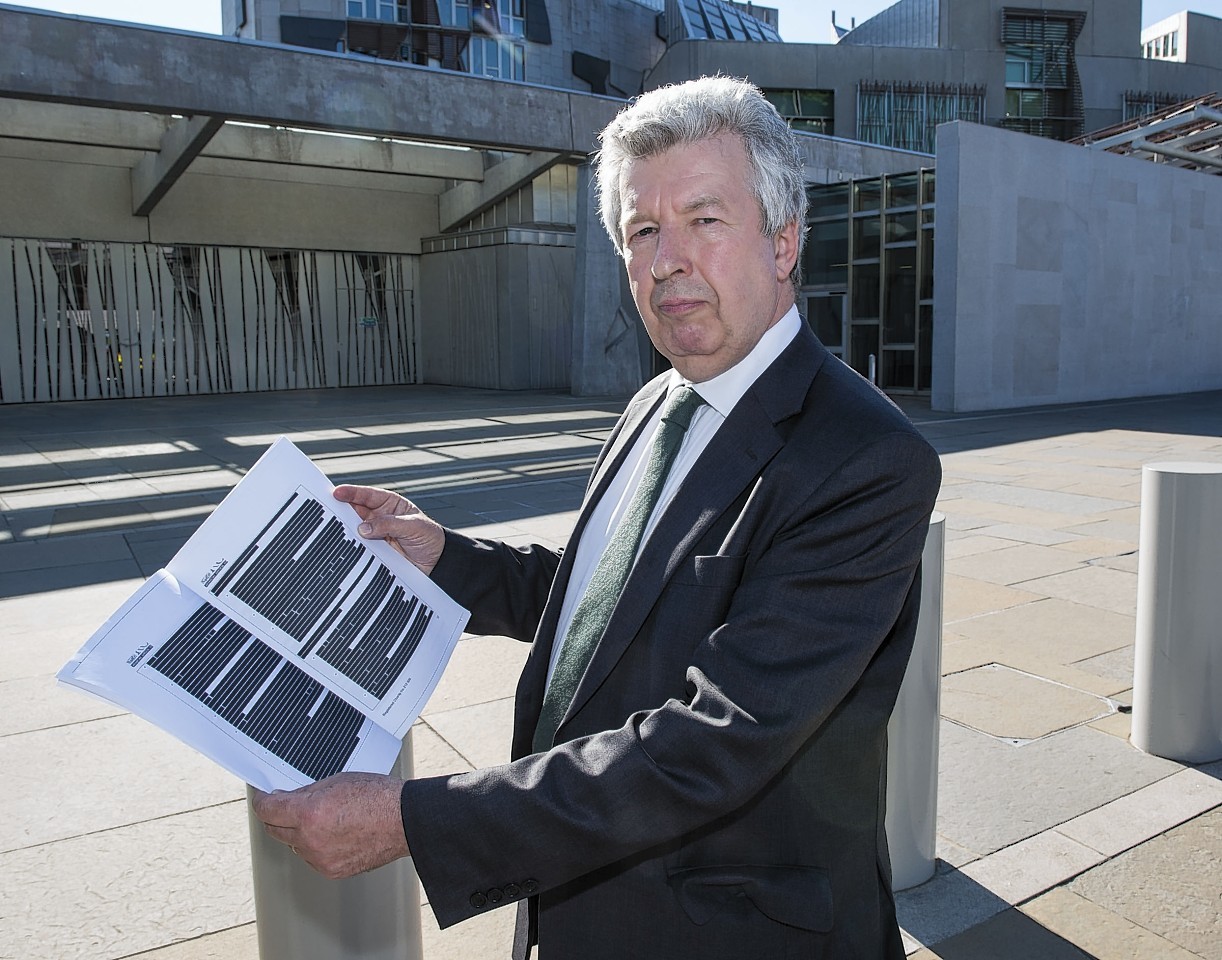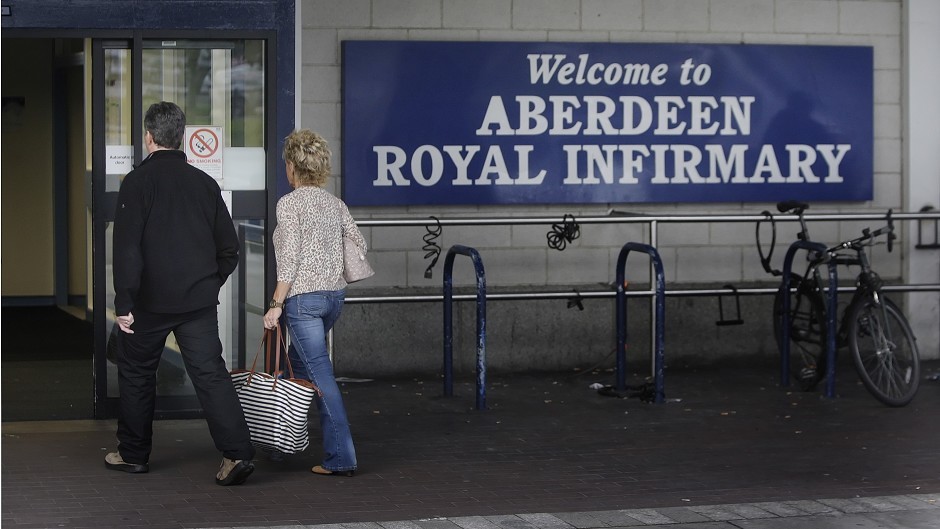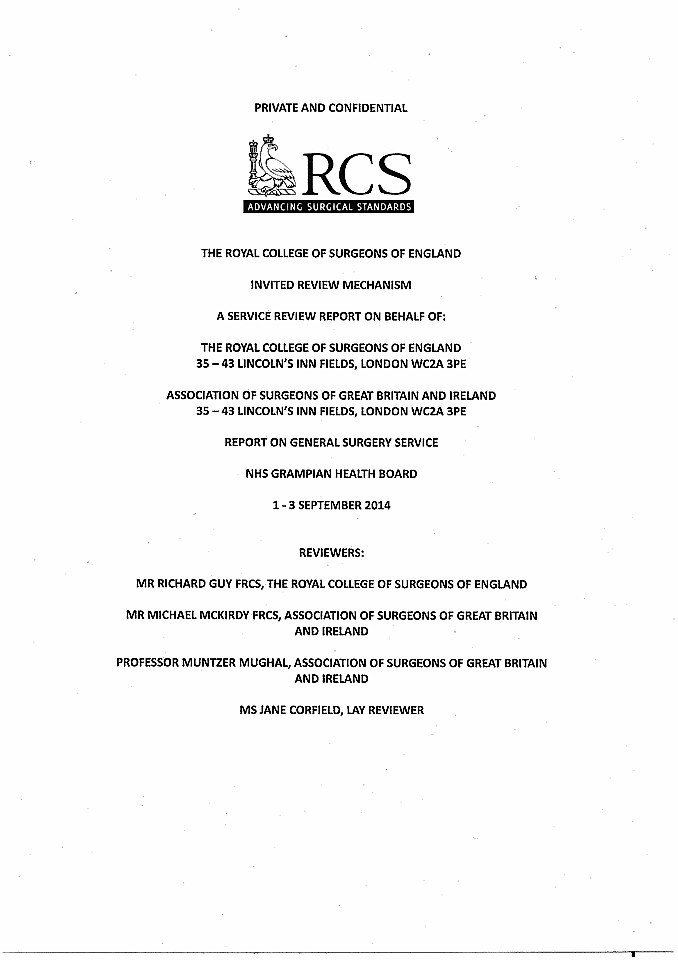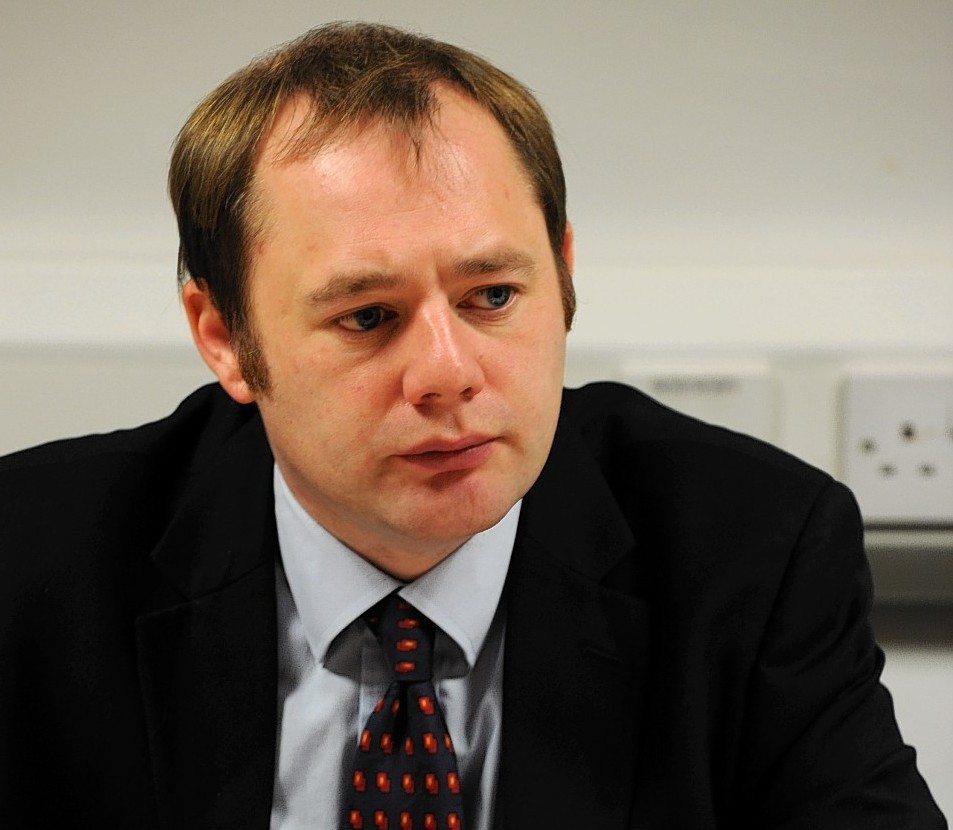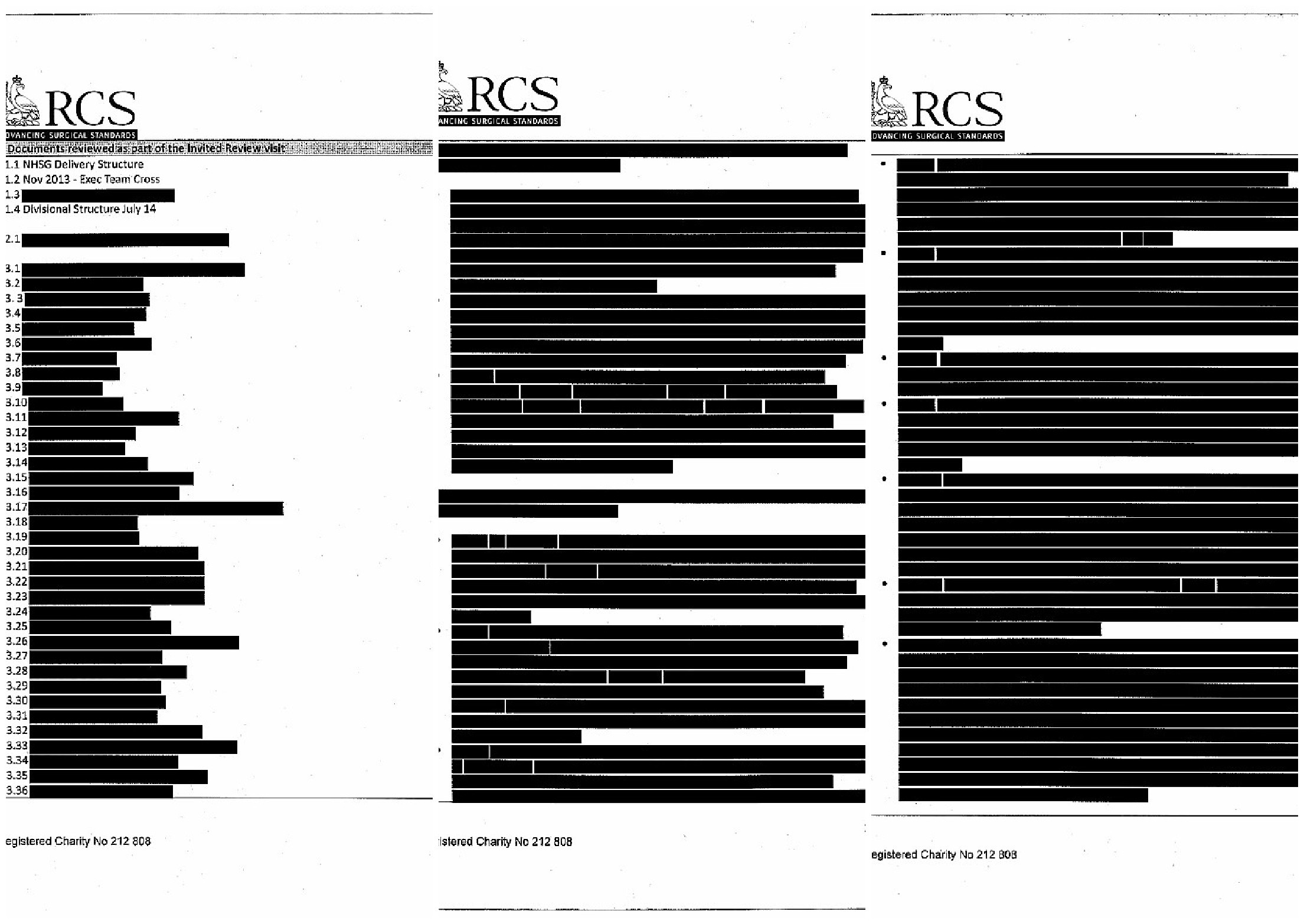A top secret report into the conduct of a group of surgeons in Aberdeen must be published urgently and in full, following the suspension of two top medics, it was claimed last night.
Pressure was mounting on the Scottish Government to make public the Royal College of Surgeons (RCS) England review of general surgery at Aberdeen Royal Infirmary.
Critics said growing anger over the suspension of the Queen’s Surgeon in Scotland, Professor Zygmunt Krukowski and his general surgery colleague, consultant Wendy Craig meant the contents could no longer be kept secret.
Recommendations were published but the complete findings have never been shared and the authorities have sought to block publication at every turn.
The Press and Journal has made two attempts to view the report under Freedom of Information laws – only to be served a copy of the 69-page document with 49-pages blacked out line-by-line in thick black ink.
It comes after RCS inspectors were asked to examine the behaviour of surgeons ,as well as the outcomes of 16 operations – mainly on the gall bladder, liver and bile ducts – in September 2014.
Concerns were also raised by employees during the probe about the way patients had been treated in a number of other surgical cases.
Lewis Macdonald MSP (Labour) said Health Secretary Shona Robison must now make public the report’s contents amid mounting controversy over the suspension of Prof Krukowski and Ms Craig.
Both were suspended from duty on May 29 after an internal disciplinary review examined allegations of bullying and harassment against the pair.
Supporters claim they have been targeted after whistleblowing about poor management at the flagship hospital – concerns which have been broadly upheld at government level.
During a health debate at Holyrood yesterday afternoon, Mr Macdonald said: “The findings of the Royal College report … remain largely shrouded in secrecy.
“Only the recommendations have seen the light of day; even the conclusions on which they are based have yet to be published.
“That is a pity, because the people of Aberdeen and Grampian deserve to know what the Royal College investigators found.”
The RCS has urged NHS Grampian to review the surgery cases raised with the inspection team as a matter of priority and to ensure patient care had been appropriate.
While there was no information to suggested the general surgery service was unsafe, the board was told to ensure data on rates of disease and death of patients was reliable.
The review team was also made aware of a board investigation into the way a consultant general surgeon was appointed.
A separate Aberdeen-based probe was also held into claims of discrimination based on the grounds of “protected characteristics” – such as gender and race.
The RCS urged the board to refer any findings of serious breaches of “professionalism or probity” to the General Medical Council.
It is understood that Prof Krukowski and Ms Craig have been referred to the professional regulator for further investigation, although the details remain private.
Supporters of Prof Krukowski, 68, say he has delayed retirement in order to fight to clear his name following an unblemished career of more than 40 years in which he has lectured around the world.
Ms Craig, 36, who has been registered in general surgery since January 2014, is said to be devastated about the allegations against her.
A petition to have the pair reinstated has attracted more than 1,200 signatories with a number of patients speaking publicly in support of them.
Others have spoken of cancelled appointments and extended waits for test results.
The RCS report has been criticised by a number of medics, with claims that some employee testament was treated as fact without proper corroboration of statements.
In some cases, it is claimed, witnesses were not called to give evidence.
Mr Macdonald said that if the RCS had investigated similar matters in England, the report would have been published due to heightened “duty of candour” in tackling issues in public service.
Professor Jamie Weir, a retired radiologist and chairman of Aberdeen-based patient lobby group Pact, said that if the report could not be made public, it should not have been handed over to NHS Grampian.
He said: “It would not have passed requirements that existed when I was vice president of the Royal College of Radiologists in the late 1990s. The standard of the Royal College report would have caused me concern.”
Richard Baker, Labour MSP for North East Scotland, said transparency was essential.
He said: “In every other example, in terms of health matters where there are issues of this magnitude, the findings have been published. It is surprising in this case that they have not.”
Last night, Health Secretary Shona Robison said: “The RCS report was commissioned by NHS Grampian and includes sensitive confidential information about NHS Grampian staff, some of which is the subject of ongoing HR procedures.
“Publication of the report is a matter for NHS Grampian, although they are bound by confidentiality issues on HR matters, just like any other organisation.
“The board have published the key findings of the report, and has also been subject to a thorough and open investigation by Healthcare Improvement Scotland which published its findings in full.”
The Scottish Information Commissioner is now investigating whether NHS Grampian was right to withold the full report.
A spokeswoman for NHS Grampian said it noted Mr Macdonald’s comments at Holyrood.
Never made public
NHS Grampian decided in November 2014 that it was only to publish the recommendations of the Royal College of Surgeons England report into general surgery at ARI.
The full findings have never been made public, despite the very public consequences of the investigation.
High levels of personal information in the report, such as the names of medics interviewed and reference to some patient cases, were behind the reasoning to withhold the guts of the document.
The Press and Journal has made to two requests for the full report to be released, with the option that the document could be redacted of sensitive personal information.
The first attempt was knocked back entirely with the newspaper referred to the recommendations earlier made available on the NHS Grampian website.
However, the review of that decision threw up an interesting result.
The 69-page document was released – but 49 of those were completely blacked out in thick black ink.
Information managers said we were not entitled to the documents, but only the information contained within it.
That information was then broadly censored on the grounds that it was of a personal nature – and that the newspaper had been happy to receive a redacted version.
While the newspaper had not sought patient names or employee information, it had wanted information on the findings, given the public interest in the issue.
The Press and Journal has now asked for a further review of this decision, with the Scottish Information Commissioner now handling the matter.
